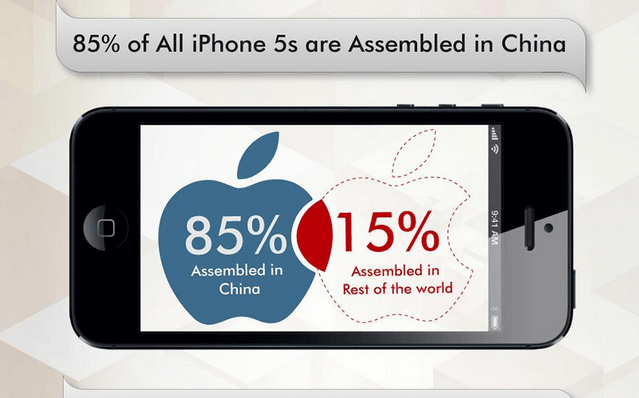Why avoid working with the wrong Chinese Android supplier? It’ll save you precious time and money. Learn from real experiences and avoid these mistakes.
Continue readingShould You Manufacture Your Smartphone In China?
This is an interesting subject to think about. Chinese goods are always looked upon with contempt.
They are cheap, unreliable and not meant for the American or European market. At least that’s the general opinion.
Obviously, Chinese smartphones just can’t compete with the greats like iPhone and even Samsung.
This is where you go wrong. Lately, there have been many Chinese smartphone manufacturers who have started competing head-on with big names.
Are Chinese Goods Made Of Poor Quality?
Did you know that 85% of iPhones are assembled in China?
If iPhones assembled in China can be of such high quality, there is no reason why other smartphone manufacturers cannot produce quality goods.
At the same time, it’s also true that most Chinese manufactured products are inferior. There are several reasons why there is such a variance in quality.
The foremost reason is quality control. Local Chinese manufacturers in their hurry to roll out their smartphones avoid or downright ignore quality control aspects.
This is a recipe for disaster. However, these enterprises justify their casual attitude claiming that the rock bottom cost of their devises compensates for the poor quality.
The consumer in China is also not bothered as long as the price is cheap. These manufacturers fail miserably when they try to sell in mature markets like US and Europe.
The quality of a product clearly depends on our attitude and emphasis. Choosing the right partner and manufacturer in China is critical to your success.
The second reason for churning out poor quality devices is the quality of components and raw material.
Sourcing the right components is an important factor in the overall quality of finished product. This aspect is tougher than it looks.
Discriminating between bad and good suppliers requires knowledge of the local market and environment.
There are many fly by wire operators who simply vanish after pocketing the advance. Chinese market is quite tricky and many US and European enterprises have burnt their hand here. You should therefore be extremely careful while choosing suppliers.
The third reason impacting quality is the actual manufacturing process. The factory facilities can make or break a product.
Seasoned outsourcing experts are aware of this fact and therefore choose manufacturing and assembly partners with extreme care.
Cost is sometimes a reason why some may turn to unknown Chinese manufacturers. This is not a good practice since culturally the locals are known to cut corners, eventually leading to sub-standard products.
The Culture Factor
More than anything else, you have to understand the culture and mindset of the local Chinese businessmen.
There is a tendency to make a killing from a single contract and there is a lack of long term commitment.
This psychological barrier has to be somehow breached if you want to produce quality products in China.
One way is to get US or European management to handle the manufacturing processes in China.
These professionals know the Chinese market well and can ensure that your product is manufactured using quality components and in a proper factory environment.
In the end, the cost incurred in engaging a professional unit can be easily justified and compensated by superior quality products.
This is an interesting subject to think about. Chinese goods are always looked upon with contempt.
They are cheap, unreliable and not meant for the American or European market. At least that’s the general opinion.
Obviously, Chinese smartphones just can’t compete with the greats like iPhone and even Samsung.
This is where you go wrong. Lately, there have been many Chinese smartphone manufacturers who have started competing head-on with big names.
Why Building Close Business Relationships in China Can Increase Your Profitability

How to Connect with the “Laoban”
When doing business in a country like China you will undoubtedly face your fair share of problems. Putting China’s history, cultural differences, and government policies aside, you still have to contend with the language barrier. But the pros of high volume and low cost quality manufacturing are unlikely to scare any prospective company away. This is where focused relationship building comes into play. If you are doing business in China or want to do business in China you need to understand how the Chinese conduct themselves in business relationships.
Business relationships differ on many levels but the standard Western viewpoint is a win/win proposition where a contract between two parties is designed for their mutual benefit and eventual long-term growth and profitability. This approach may be ideal for the Western world, but when venturing into China, business relationships change and can become far more complex and personal.
When you first establish a relationship within China it is important to come across with conviction. If you are sourcing a factory through Alibaba.com or another similar website you will likely be contacting a salesperson. He or she receives numerous emails from people with false claims with the intension of getting pricing quotes to leverage against existing factories or with other non-productive intensions. This means factories will likely dismiss non-genuine and also low-volume inquiries. The key is to come across with genuine interest. State what you want, state the quantity, and state your market. If possible, visit the factory at a trade fair or on its premises since meeting face-to-face will only help build rapport and prove your commitment.
After establishing this initial relationship, it is important to avoid believing the standard Western stigma of China as a producer of “cheap crap” with low wages and horrible human rights conditions. Harboring this impression is only going to be detrimental to your relationships. Doing business in China is not a get in/get out sort of relationship. Chinese factory owners dislike this attitude. Even though they will likely accept your order, it will not build good rapport. These factories can be valuable long-term partners for your company and also for your own personal growth. It’s the relationship you build with the “Laoban” owner or manager that can be the most beneficial. The rigid hierarchy within Chinese companies can lead to important decisions being made by the owner, so it is important to have this close relationship. This is why building strong personal relationships with business partners in China can, in the long run, increase your profitability.
Why Guanxi and Keeping Face are Important
Relationships are important all over the world, but when doing business in China the relationship is paramount. “Guanxi,” described most basically as the personal connection between two people, is the foundation of all business deals within China. Building guanxi takes time. It has the premise that if you can build trust with someone, he or she will do business with you. Alongside building these new relationships you need to maintain the old ones. Similar to having a close friend, it is not uncommon to offer meaningful gifts to your business contact’s friends and family, go for dinners and attend social events, and also offer mentoring and advice when there is no money involved. These thoughtful gestures will strengthen the guangxi relationship you have and open doors that would otherwise be closed to you.
It is important within a business relationship to see it as a partnership and to see every party as equal. Being aggressive or appearing to be above someone is disrespectful. It has been known that coming on too strongly when things don’t go as planned can result in a “loss of face” for the Chinese factory and an end to the relationship. This will happen regardless of what or who caused the problem. “Face” is very important in Chinese culture. “Face,” equated to Western values, means reputation. If you imply that people have made a mistake by messing up an order or failing to act on something, they will “lose face” and their reputation will be tarnished. CEOs in China have committed suicide after losing face and shaming themselves after bad business deals. This is why working problems out as a partnership, whoever is to blame, is a way to maintain these relationships and build deeper guanxi.
Whoever is to blame when approaching problem issues with factories, it is paramount not to lose your temper. You should stay relaxed and keep blame to a minimum. The way to resolve issues like this is to forget who is liable and work out a solution. Use W. Edwards Deming’s rule, “Focus on the process, not on the people.” Chinese factories typically don’t accept returned goods and will help out only if you deal with the situation appropriately. Conversely it is important not to be perceived as a pushover. Respect your Chinese partners but also politely demand respect back.
Establishing and maintaining relationships in a foreign country can be challenging but can pay off by being respectful and patience. If you approach situations in China with the correct attitude you will “keep face”, build guanxi and then you can see profits in your business as it flourishes.


